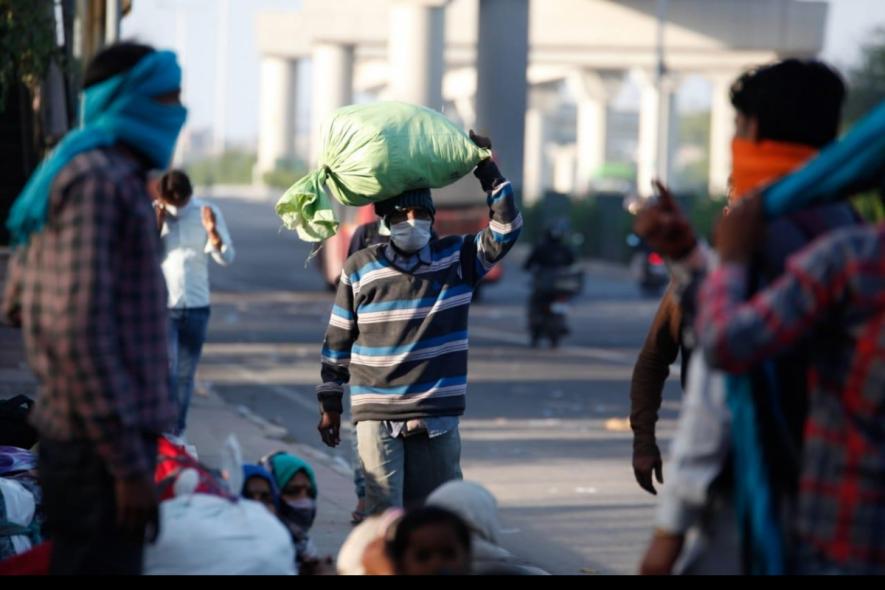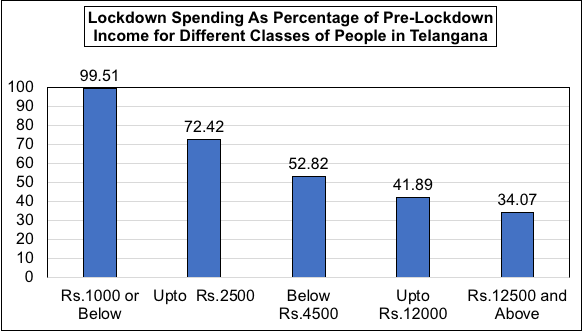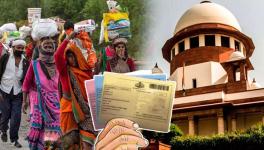COVID-19: Indebtedness Among Poor Increased During Lockdown in Telangana, Says Survey

This report seeks to understand the impact of the COVID-19 induced lockdown in Telangana and is based on telephonic interviews of 57 respondents, which covered 247 people, from different occupational backgrounds during June 1 to June 10. Even though, the sample size is very small and is in no way a representative sample, however, in the absence of more reliable data, this telephonic survey gives us some preliminary hints about the ground level reality.
The respondents were from Hyderabad, Shapur, Warangal, Mancherial, Mahabubnagar and Rangareddy. Twenty-three out of total 57 respondents were migrant workers and they were originally from different states like Manipur, Odisha, Uttar Pradesh, Bihar, Madhya Pradesh, Tamil Nadu and West Bengal. The respondents were from diverse occupational backgrounds including farmers, agricultural workers, daily wage earners, construction workers, autorickshaw drivers, masons, fruit and vegetable venders, cooks, domestic helps, tailors, carpenter, bike mechanic, home maker, tea-shop owner, store keeper, engineers, cashier, driver, boutique and garment shop owner, embroidery worker, rural development professional, sales advisor, Amazon catalogue specialist, skin therapist, guest relation associates, trainer, teacher, educational consultant, sales manager, beauty consultant, DJ operator etc.
There are 28 female and 29 male respondents in our sample, aged between 18 to 70 years. There are 31 Hindu, 21 Christian and 5 Muslim respondents from illiterate to MA degree holders. There are 29 respondents from the scheduled castes and nine respondents from the scheduled tribe backgrounds in the sample. Roughly, one-fifth of the respondents belong to the per capita monthly income class of Rs. 1,000 or below, one-fifth belong to above Rs. 1,000 but less than or equal to Rs. 2,500, one-fifth belongs to Rs. 2,500 to below Rs. 4,500, one-fifth belongs to Rs. 4,500 to Rs. 12,000 per month and the rest one-fifth respondents belong to the per capita monthly income class of Rs. 12,500 and above. The family size varies from 1 to 12 in the sample with average family size being 4.3. There are 26 families with single earning members and 6 families with more than two working members.
One of the most important findings of this survey is that 25 respondents out of 57 (i.e. less than half) are expecting their monthly earning to remain intact after the lockdown gets over and most of them belong to the top and the bottom income class. Fourteen respondents are suspecting that their average monthly earning would reduce by one-third on an average. The rest 18 respondents (i.e. more than 30%) have said that ‘they have no idea’. Therefore, there is extreme job vulnerability and uncertainties about income in the minds of majority of the workforce. More than 50% respondents have opined that there is a need for some kind of employment of last resort programme (like the MGNREGS) in the urban areas also.
Another interesting finding is that the ratio of per capita monthly expenditure of the family after lockdown (in the months of April and May) to the per capita average monthly family income before lockdown is substantially lower for the richer section of the sample population (see graph below). For the poorer section of people, this ratio is very high because of the following two reasons. Firstly, the average consumption propensity is higher for the poorer section of population and richer people save more proportion of their earnings. But, most importantly, the poorer people consume mostly the essentials with subsistence level of expenditure, which is difficult to cut down further even after sudden fall in income due to the COVID-19 lockdown.As a result of this, 29 respondents (most of them are from poorer sections of population) have reported an increase in their indebtedness during the lockdown.

Source: Based on survey data collected through phone calls during 1st-10th June.
The Union government of India has announced three concrete things in the month of March in the PM Garib Kalyan Yojana – free ration, Rs. 500 direct benefit transfers to the Jan Dhan accounts and free gas cylinder. Ten respondents (around 20% of the sample) have reported that they have not got any free ration even after two months of the announcements. Almost half of the respondents (26 out of 57) have said that they either do not have any Jan Dhan account or they have not received any money in it. More than 90% people have reported that they have not got any free gas cylinder even after two months of the lockdown. Thirteen out of total 23 inter-state migrant workers want to go back to their native states after the lockdown and 10 do not want to go back. Twelve respondents said that they had other ailments in the family apart from COVID-19 and 11 of them have reported various difficulties in the treatment of those patients due to lockdown.
As far as the comments and suggestions of the respondents about what is to be done are concerned, we have got the following feedback. There is an opinion that this is the time when government should step up and makes sure the daily wage labourer and the needy are not neglected. The government should at least provide the basic needs such as vegetables and other commodities to the poor and needy people. There is a strong demand for cash transfer not to the tune of Rs. 500 but, at least around Rs. 7,000 to Rs.10,000 per month as a compensation for income loss during the COVID0-19 induced shutdown. The state government’s effort of transferring Rs. 1,500 to the poor has been appreciated. Everyone should get ration irrespective of the possession of ration card and there should be facilities so that migrant workers are not forced to go back to their native places. There is this feedback that the government promised that everyone will get money and asked to stay wherever people are but many did not get any money. There is this suggestion that the government should start public industries and give the opportunity for work. There is a demand that the government should make mandatory that landlords do not charge rent during this economic lockdown and the electricity bills should be borne by the respective state governments. The government should help the unorganised sector workers like the auto drivers and small businesses like the small shops by giving them some financial support. The government must ensure some employment opportunities for all with a secure and steady income. There is a strong demand for making healthcare free at least during a crisis situation like this. People are of the opinion that there should be greater coordination between different tiers of the governments to formulate a better strategy and to have a better plan for fighting this ongoing challenge. Hope, the governance would be more sensitive and responsive to the need of people in this largest democracy!
Surajit Das is an assistant professor at the Centre for Economic Studies & Planning, JNU. Athary Janiso and Prakash Kumar Shukla are PhD Scholars at the Department of Economics and Finance, BITS-Pilani Hyderabad Campus.
Get the latest reports & analysis with people's perspective on Protests, movements & deep analytical videos, discussions of the current affairs in your Telegram app. Subscribe to NewsClick's Telegram channel & get Real-Time updates on stories, as they get published on our website.























